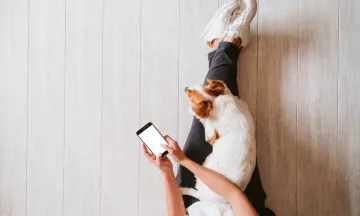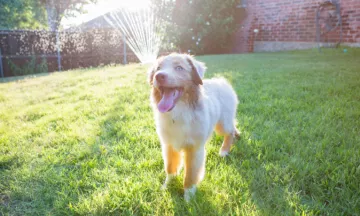Dogs can sometimes seem to have a 'guilty' expression, especially when they've done the wrong thing. You see funny videos of dogs on social media that seem to look guilty after they've been caught doing something naughty. But do dogs really feel guilt like we humans do? And what should and shouldn't you do when your dog looks guilty?
Dogs undeniably experience emotions such as happiness, anger, sadness and fear. You can recognize these emotions by the dog's body language. For example, an angry dog might bare it's teeth, a happy dog might wag it's tail and an anxious dog might yawn excessively. Emotions are simply automatic and instinctive physical reactions to external stimuli.
Do dogs also understand the concept of right and wrong? The answer is - absolutely not. We humans are very aware of moral behaviour and codes of conduct in our social groups. It's important to most people to be kind and respectful to others, to not steal or be violent etc. Dogs simply do not have this system of rules and values.
A dog's behaviour is much more instinct-driven. For example, if they chew on your expensive shoes, they are totally unaware that they are doing something 'wrong'. Certain habits can be taught or unlearned, which is simply a process of the dog favouring behaviours for which they are rewarded. A dog does not make moral choices. Therefore, if a dog destroys your expensive carpet, it isn't to be naughty or upset you. A dog follows it's instinct. So what explains the guilty behaviour?

Guilt or fear?
Dogs are extremely sensitive and responsive to changes in our behaviour. We can interpret a certain look or physical posture as 'guilty', though it is, in fact, something completely different.
Imagine this situation: A dog has peed in the house, and when you come home and get angry with the dog. Your voice goes down and you say: 'Bad dog! No!". The dog is sensitive to your physical posture and change in vocal tone, so quickly gets the picture that you are not happy. But the dog hasn't got a clue why: the peeing happened hours ago and the dog cannot link it to your angry mood. The dog is totally confused and does not like when their best friend is angry, so they display stress signals: the eyes turn away, ears go down flat, tail low, licking of the lips or yawning and so on. We can interpret this body language as guilt, but in reality, the dog is anxious and stressed.
The next time the dog accidentally pees in the house, it might already be afraid that you will get angry. This isn't because it understands that the act of peeing inside is 'wrong', but because it links the puddle in the house to the owner's angry mood. The dog is scared and may already be hiding, shaking, ducking away in a corner, etc. This is not a feeling of guilt, but fear and confusion.

What should you do if a dog has been "naughty"?
First and foremost, you should never punish a dog.
Dogs don't have moral values and don't understand if they have been naughty. Sure, you can correct unwanted behaviour, provided you do this at exactly the same time as the behaviour takes place. For example, a dog chews on your shoe. When you see this, you intervene and say 'no', remove the shoe and replace the shoe for something that the dog can chew. At this point, you can reward the dog.
If the unwanted behaviour is in the past, you can no longer correct this behaviour. A dog does not have a language system like us and we can't expect a dog to understand and reflect on the concept of the past. Instead, it's important to find out why the dog has shown the unwanted behaviour in the first place.
A lot of destructive behaviour is prompted by stress, boredom or frustration. If a dog receives too little attention and physical/mental challenges, boredom can be a serious problem. Demolition behaviour indicates your dog is trying to lower it's stress levels. Make sure your dog gets enough stimulation. Is your dog alone in the house for a long time during the day? Then call in a dog sitter from Pawshake. Your dog sitter can pop by to walk and play with your doggo during the day, and ultimately have a positive impact on your dog's happiness and behaviour.
And if your displays 'naughty' behaviour such as peeing or pooing inside, pay attention in case there is a medical cause (and be sure to report this to the owner if you are a pet sitter). If in doubt, consult a veterinarian.
When a dog no longer has to fear their owner, the bond between a dog and a human can become unbreakable. If you learn to understand your dog's body language from a dog's point of view, you can build a relationship with the dog based on trust and friendship. And both of you will enjoy it for a lifetime!
Do you need a dog sitter to exercise and play with your pooch while you are out? Visit Pawshake to find a reliable and friendly dog sitter.




